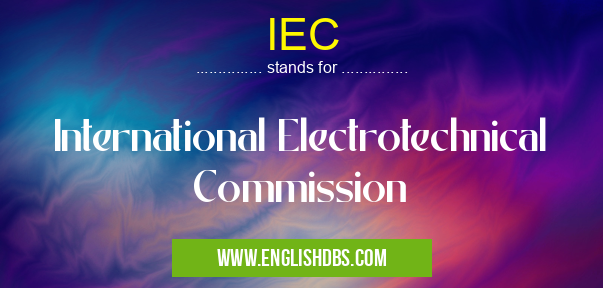What does IEC mean in NEWS & MEDIA
The International Electrotechnical Commission (IEC) is an important international standards body that works to develop and promote global standards for the electrical, electronics and related technologies. The IEC provides assurance of safe and innovative operations in today’s rapidly changing world. It works with its partners to ensure that organizations across the globe are able to meet their needs in effective and sustainable ways. By setting and enforcing quality standards, the IEC helps reduce risk by ensuring that products from different countries are designed, manufactured, and tested according to common safety requirements.

IEC meaning in News & Media in Community
IEC mostly used in an acronym News & Media in Category Community that means International Electrotechnical Commission
Shorthand: IEC,
Full Form: International Electrotechnical Commission
For more information of "International Electrotechnical Commission", see the section below.
Meaning
The International Electrotechnical Commission, or IEC, is a collection of member countries who develop international standards for electrical devices and components used around the world. The standards it creates establish acceptable levels of performance for various types of equipment, including lighting, cable insulation, transformers, motor controls, electric motors, circuit breakers and magnetic components. The IEC also publishes guides for electrical engineers on topics such as circuit design, installation practices and safety procedures. Additionally, it coordinates activities between members to promote mutual understanding among scientists and technicians in each country’s Electrical Engineering field. This collaboration leads to other benefits such as creating a global market for standardized goods.
Benefits
The primary benefit of IEC standards is improved safety for people using electrical products in their homes or workplaces. Electro-technical product manufacturers must comply with relevant testing criteria laid down within the standard in order to ensure their products are safe before entering wider use by consumers. Testing conducted under these requirements often includes tests such as dielectric strength (withstand voltage test), insulation resistance measurements or temperature rise assessment under overload conditions (high current test). Defective products can be identified quickly due to increased adherence to quality control principles proposed by IEC standards. Additionally, corporations benefit from utilizing international standards as they help mitigate risks associated with buying materials from multiple vendors that specialize in different technical areas or countries with varying regulations regarding manufacture/testing processes (i.e., import/export difficulties). Use of common symbols increases understanding between team members who could potentially be separated by language barriers or cultural differences while still being able to communicate effectively used widely accepted conventions or wording throughout a document
Essential Questions and Answers on International Electrotechnical Commission in "COMMUNITY»MEDIA"
What is the International Electrotechnical Commission (IEC)?
The International Electrotechnical Commission (IEC) is an international standards organization that seeks to create and promote international standards for a wide range of electrical, electronic, and related technologies. IEC standards provide technical guidance and specifications for products, services, processes, systems, personnel qualifications, testing activities, and methods of operation.
What does the IEC do?
The IEC works towards harmonizing national policies with global goals so that its members can make use of standardized technology and products in their own markets. Its mission is to facilitate international trade by providing global standardization for electrical and electronics goods and services.
Who are the members of the IEC?
The IEC has over 77 members comprised of National Committees from industrialized countries around the world. Membership also includes representatives from non-governmental organizations as well as regional economic integration organizations such as ASEAN and EFTA.
How often does the IEC meet?
The IEC meets twice a year for general assemblies, in May/June at its headquarters in Geneva, Switzerland or nearby locations; while in November/December they meet at other venues across the globe. In addition to this there are regular technical committee meetings held throughout the year as well as various virtual meetings taking place online.
What types of standards does the IEC cover?
The IEC covers a wide range of topics related to electricity and electronics from appliances and equipment to health care technology applications, safety regulations for dangerous appliances, information technology systems requirements, renewable energy sources such as wind turbines or solar farms plus much more.
How can one become involved with the IEC?
Individuals may become involved by submitting comments or requests for clarification on draft documents circulated during technical committee sessions or proposing new work items via their national committees or contact offices directly. Participation may also include attending meetings and formalizing decisions made during sessions through voting either individually or within their nation’s delegation.
Does one have to pay fees to join the IEC?
It depends on one's membership status – those who join through their respective national body typically pay an annual fee which helps support both the main commission's operations as well as those applicable activities undertaken within each member country’s boundaries; companies seeking direct membership are liable to pay a higher fee based upon their volume of activity relative to others within similar sectors or industries plus any additional costs associated with product testing where required.
Does my company need access to any specific documents prior joining?
No – documents can be accessed without prior authorization when visiting the relevant website link provided by your chosen contact office although certain documents require payment before access can be granted regardless of membership status; some free resources are available but these tend not to be comprehensive enough for most organizational needs outside of general awareness requirements.
